Why Preventing Diabetes With Lifestyle Measures Can Add Over A Decade To Your Life

Living longer is a numbers game.
Sure, you could choke to death on the cap of a pen (sadly, some people do), but focusing your efforts on avoiding choking to death on pen caps as a strategy to extend your lifespan is unlikely to be very effective.
Focusing your efforts on preventing type 2 diabetes, however, is arguably one of the best strategies you can use and is likely to have the biggest gains.
Here’s why.
First, let’s set some terms.
-
When I say diabetes, I am referring to type 2 diabetes, not type 1 diabetes.
-
Everyone exists along a spectrum of insulin sensitivity.
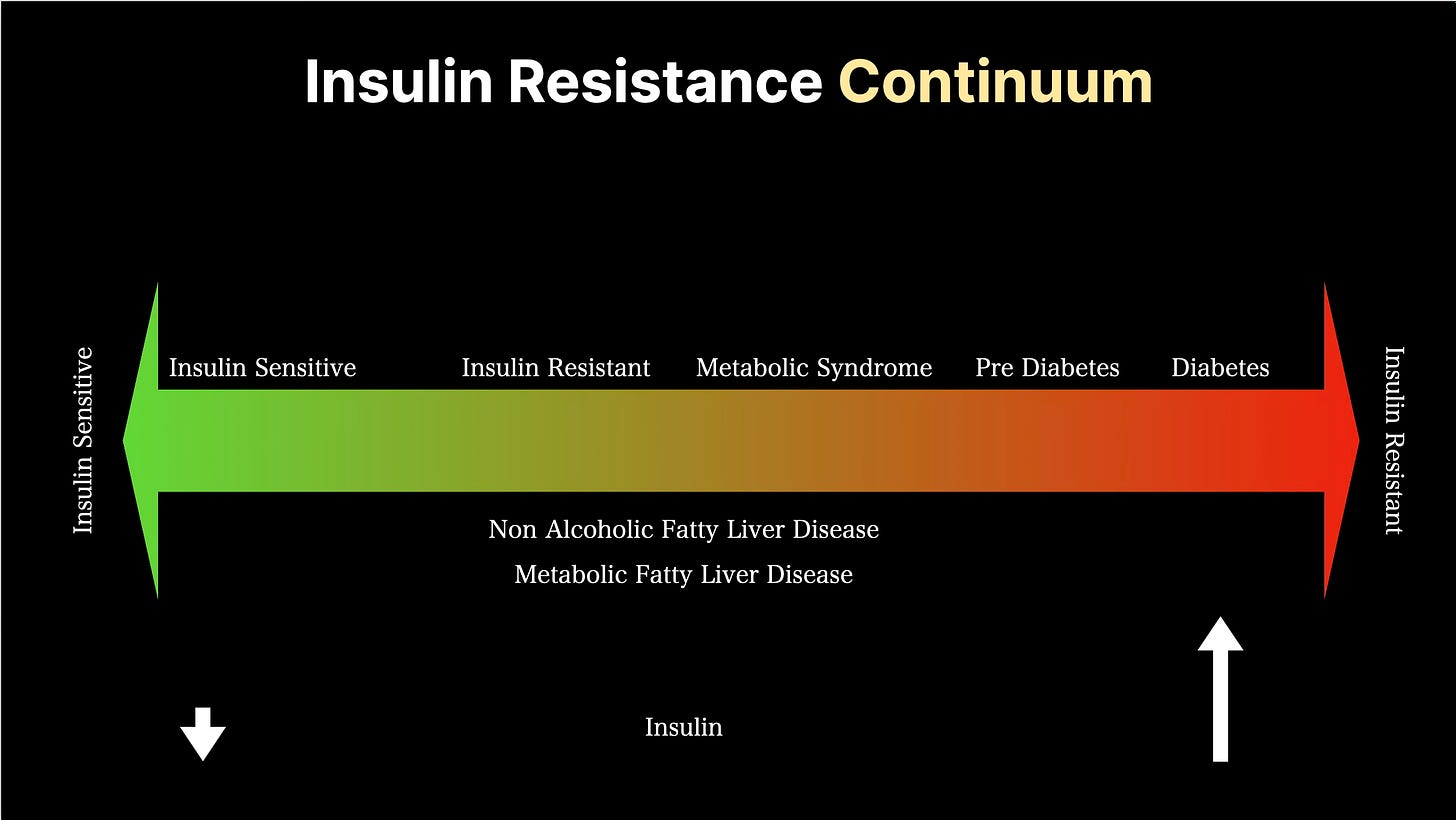
For those who progress along that spectrum to the point of severe insulin resistance, they are diagnosed as having Type 2 Diabetes.
But there are decades of insulin resistance preceding this and also many milestones along the way, including metabolic syndrome, insulin resistance and pre-diabetes.
Not everyone who meets the criteria for metabolic syndrome will become diabetic, but falling into this category means you share much of the same underlying physiology.
You have to think of this as a matter of degree.
Yes. If you have diabetes, you are on the extreme end of the scale, but even if you have not progressed to that point, you still carry many of the same risks.
What Are Those Risks?
Having diabetes is very likely to shorten your life.
However, the magnitude to which your life will be shortened is highly dependent on WHEN you are diagnosed with diabetes.
If you are diagnosed with diabetes in your 70s, you are about 39% more likely to die from any cause compared to someone who does not have diabetes at age 701.
However, if you are diagnosed with diabetes in your 30s, you are 169% more likely to die prematurely in the following years.
This is a BIG difference.
How Many Years Will Diabetes Take From Your Life?
The answer to this question depends on your sex and the age at which you are diagnosed.
If you are diagnosed with diabetes in your 30s as a male, you lose, on average, 14 years of your life.
As a female diagnosed in your 30s, you lose about 16 years.
With an average lifespan of 77 years, that is between 18 and 20% of your lifespan.
That is huge!

For every decade earlier you are diagnosed, you stand to lose about 3-4 years of life expectancy.
Why you die earlier is likely down to the earlier onset of the two major diseases that are the leading causes of death worldwide:
-
Cardiovascular Disease
-
Cancer.
An earlier diagnosis of diabetes is associated with a significantly higher risk of both conditions.
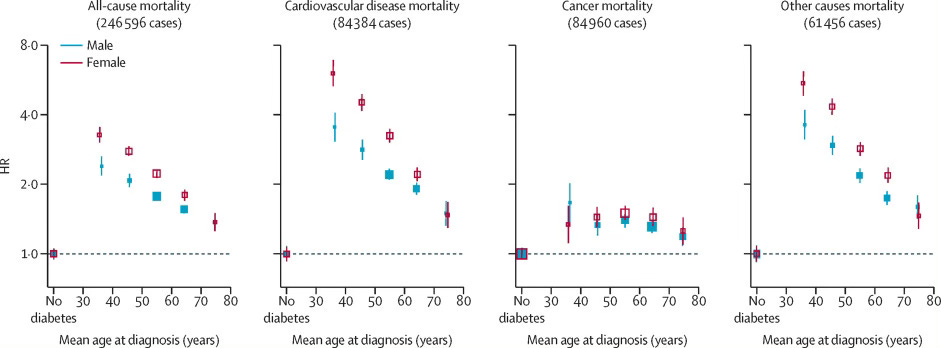
A diagnosis of diabetes in your 30s is associated with about a FOUR TIMES higher risk of both cardiovascular and cancer mortality.
We also know that having a diagnosis of diabetes earlier in life pulls forward the onset of cardiovascular disease by about 10 years2.
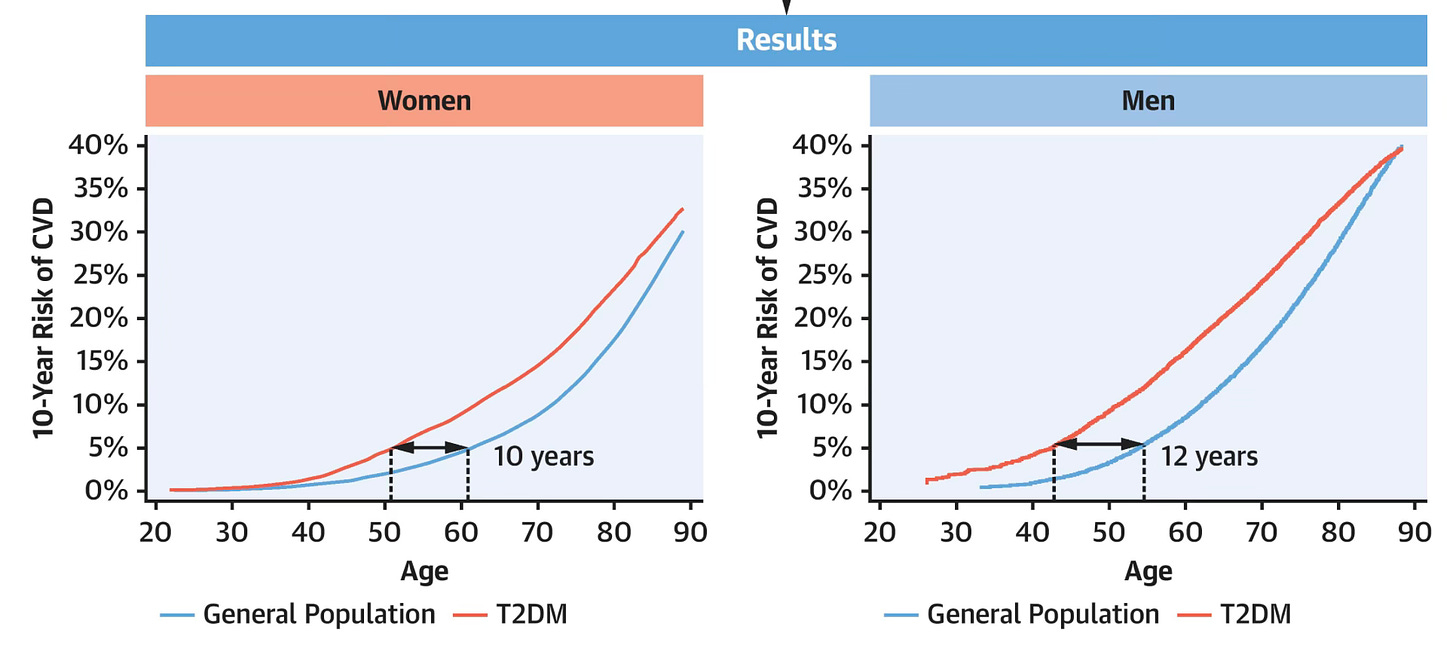
Remember.
This is a numbers game.
The way to live longer is not to get one of the leading two causes of death early in life.
You avoid these by not having a major risk factor for both of them, i.e. diabetes.
Is Diabetes Avoidable?
Yes.
Here’s what we know.
Diabetes does not appear overnight.
It develops slowly, probably over years, if not decades.
The hallmarks of insulin resistance can be detected long before the abnormal glucose changes typically seen with a diagnosis of diabetes.
Avoiding diabetes is a multifactorial issue, but we know physical fitness plays a huge role.
The higher your aerobic fitness, the less likely you are to develop diabetes.
This is not a small effect size; it is considerable.
For those at the highest fitness levels, the likelihood of developing diabetes in the coming years is reduced by 90%3.
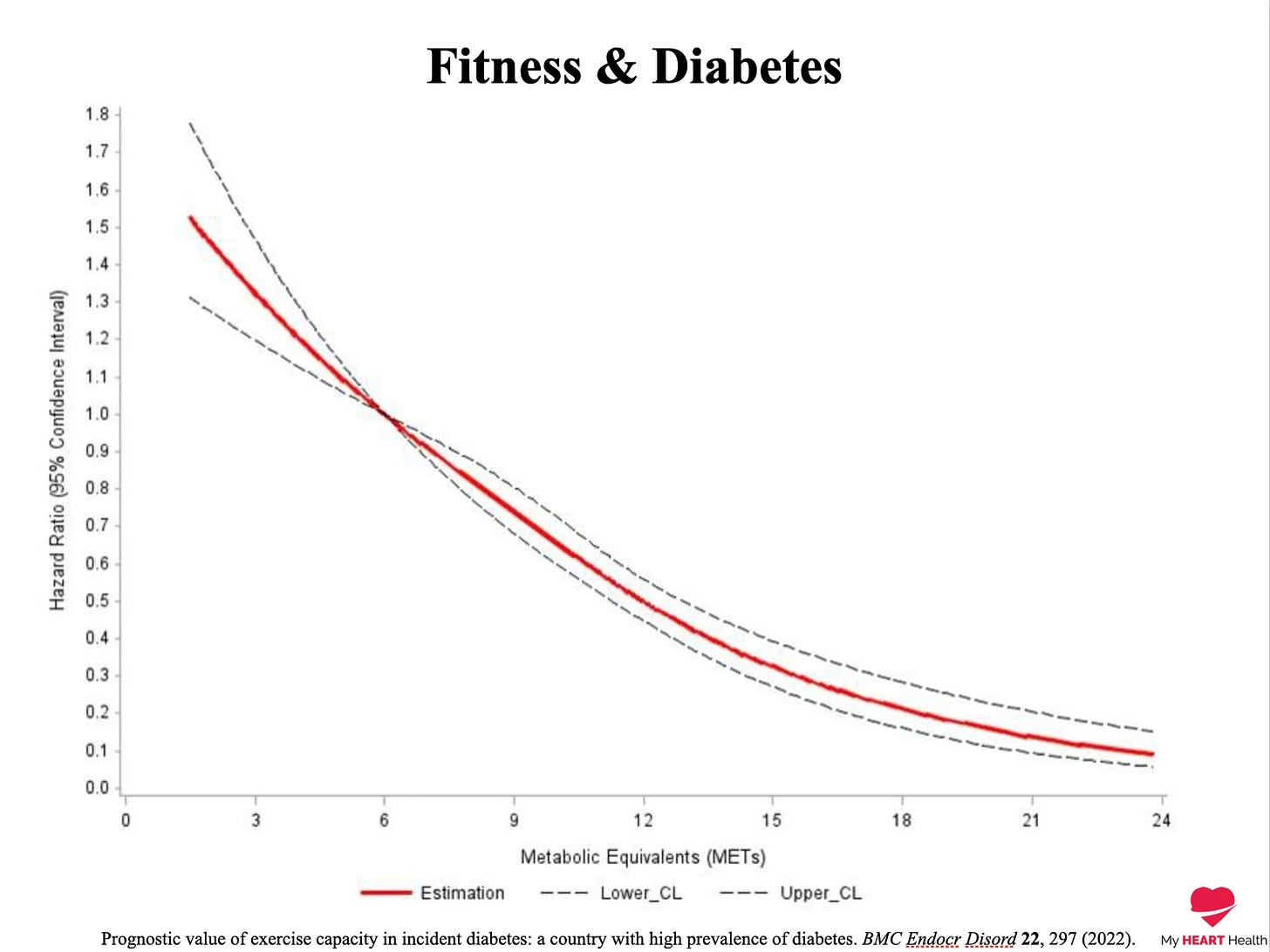
For every 1 MET increase in energy that can be expended, there is a 12% reduction in the risk of diabetes.
The role of exercise in preventing diabetes is critical and arguably one of the biggest levers that can be pulled.
Insulin resistance likely starts in muscle, and high fitness levels ensure that muscle sensitivity is maintained.
But exercise is not the only factor at play.
Remember, this is a game of odds.
We leverage the highest impact factors first, but this is a multifactorial process.
This is about an overall lifestyle approach.
Optimal lifestyle factors include:
-
Normal weight
-
Normal Cholesterol
-
Good Diet
-
Normal Blood Pressure
-
Not Smoking
-
Being Physically Active
Maintaining most or all of the above factors results in a 64% reduction in the risk of diabetes4.
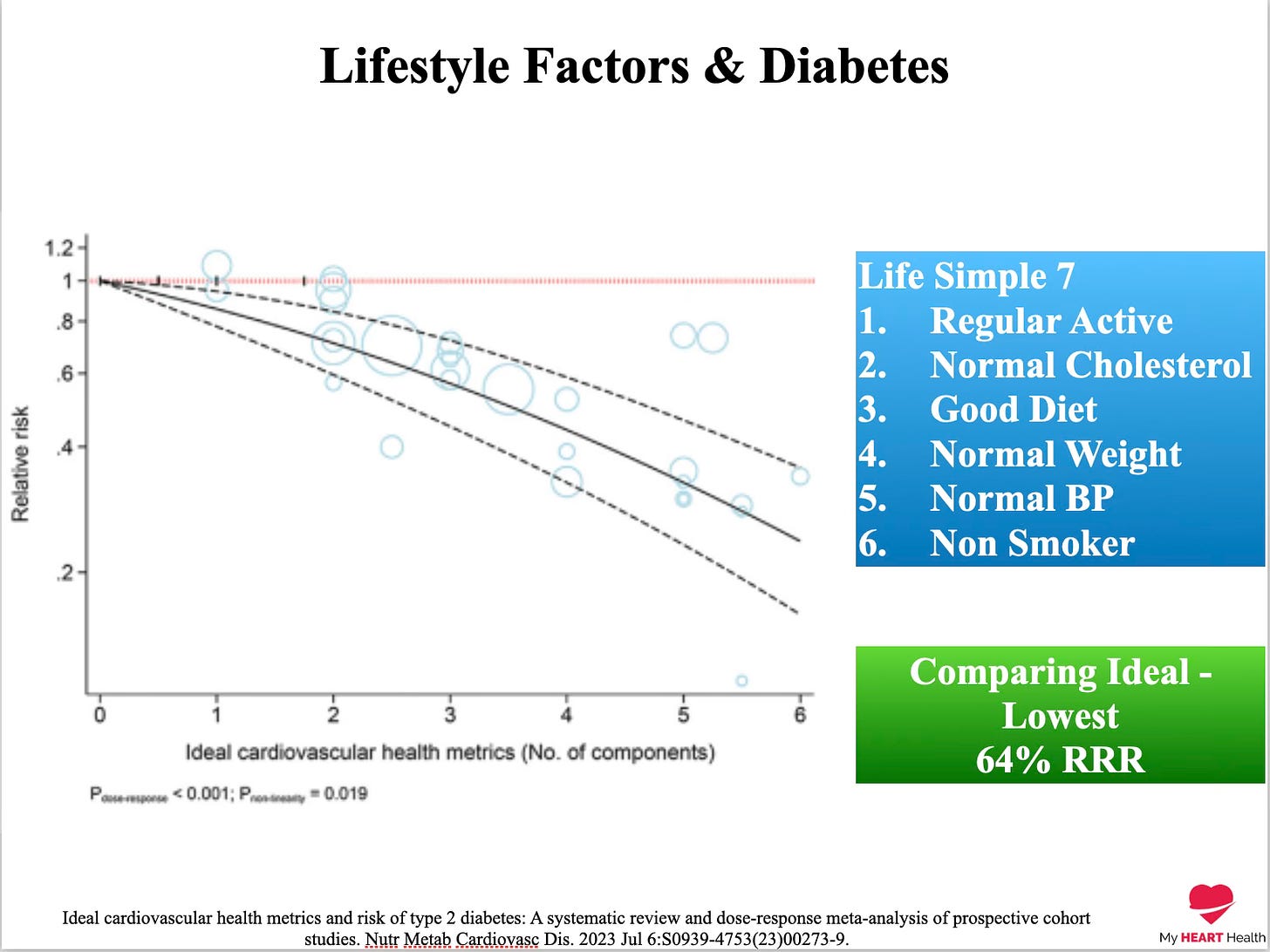
Impressive findings.
Until a recent analysis showed that these reductions can be pushed even lower.
A 10-year follow-up study of 170,000 individuals in the UK Biobank showed that those who achieved optimal lifestyle metrics similar to those mentioned above, including good sleep, were…
Wait for this..
95% less likely to develop diabetes over the next decade5.
Just to be clear.
Hitting all the appropriate lifestyle metrics does not entirely eliminate the risk of diabetes.
It does, however, massively reduce the odds of developing diabetes.
-
The condition that is associated with a 14-16 year reduction in life expectancy.
-
That results in a significant increase in the risk of cardiovascular and cancer deaths.
If you are serious about living longer with a higher quality of life, making optimal lifestyle a priority must be front and centre.
With high fitness levels at the top of that list.
The drug therapies available to treat diabetes, cardiovascular disease and cancer have improved tremendously over the last several decades.
However, it is unlikely any drug therapy will ever match the reduction in risk that good lifestyle factors will play.
Yes. Many factors likely stand in your way.
I, too, struggle with these each and every day.
We are all too busy.
But our physiology does not care.
We cannot guarantee outcomes, but we can set up probabilities.
And those probabilities are clear.
Place your bets.
Emerging Risk Factors Collaboration. Life expectancy associated with different ages at diagnosis of type 2 diabetes in high-income countries: 23 million person-years of observation. Lancet Diabetes Endocrinol. 2023 Oct;11(10):731-742.
10-Year Cardiovascular Risk in Patients With Newly Diagnosed Type 2 Diabetes Mellitus. J Am Coll Cardiol. 2023 Oct, 82 (16) 1583–1594.
Prognostic value of exercise capacity in incident diabetes: a country with high prevalence of diabetes. BMC Endocr Disord 22, 297 (2022).
Ideal cardiovascular health metrics and risk of type 2 diabetes: A systematic review and dose-response meta-analysis of prospective cohort studies. Nutr Metab Cardiovasc Dis. 2023 Jul 6:S0939-4753(23)00273-9.
Life's Essential 8 and risk of non-communicable chronic diseases: Outcome-wide analyses. Chinese Medical Journal ():10.1097/CM9.0000000000002830, October 10, 2023.




